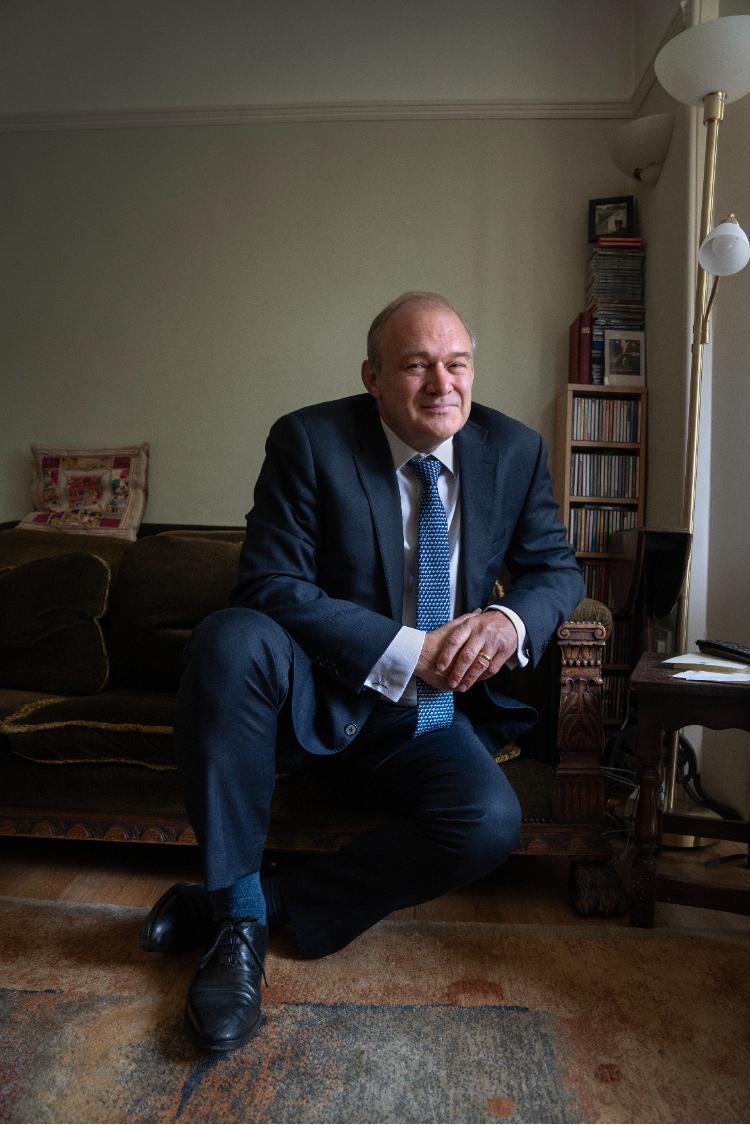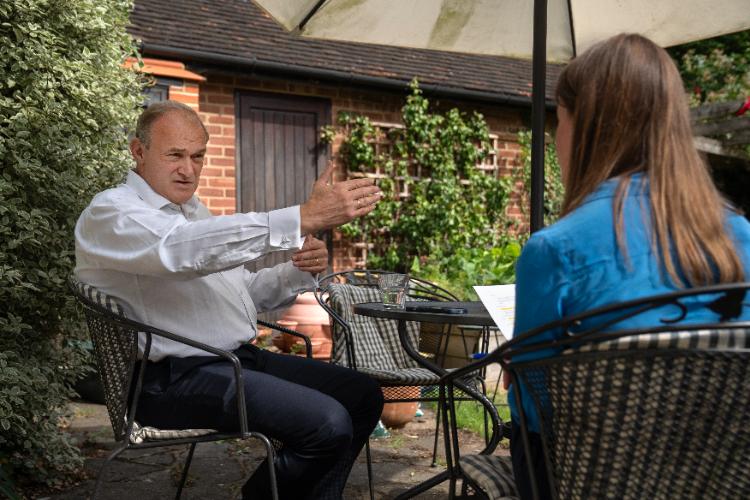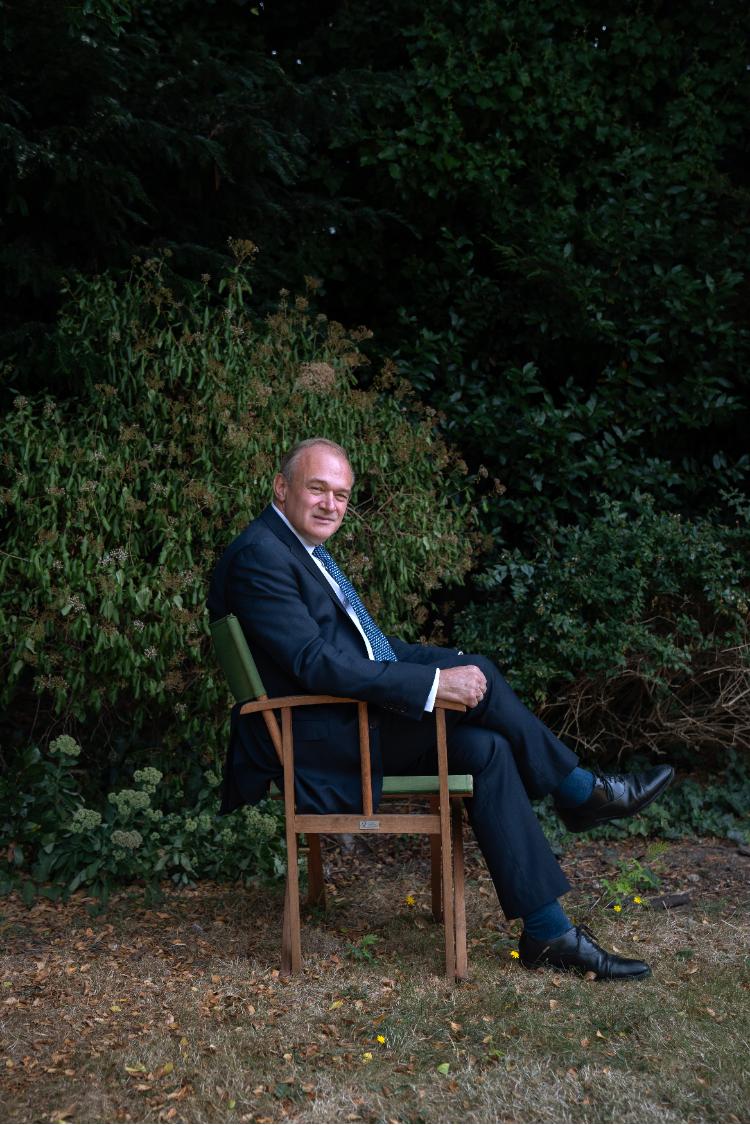Ed Davey: Tories will have us 'breathing down their necks'
Ed Davey (Photography: Tom Pilston)
12 min read
Liberal Democrat leader Ed Davey oversaw a campaign that elected a record-breaking 72 Lib Dem MPs to Parliament. He speaks to Sophie Church of his disappointment on Labour’s current gloomy outlook, and how the Lib Dems are strategising for the next election. Photography by Tom Pilston
Ed Davey, sitting at his garden table in the last day of summer, castigates Keir Starmer for casting a chill over the country just as it was looking for a hopeful new start.
In his first full interview after the election, the Liberal Democrat leader says Labour has spurned the chance to use its victory to win new investment with its downbeat messages.
“If you’re ambitious, you can be far more hopeful,” he says. “It’s all doom and gloom, and I think there are things that you can do relatively quickly to show people that the change that people voted for, the change people want, can be delivered.
“They should say: ‘That’s where we’re going. We can do it. It’s possible. Here’s how we’re going to do it. Come on with us.’ If you did that, I think you’d change the mood, you’d change the dynamics, investment would come more quickly in a greater level.”
For me, unless you get the health service right, people can’t be free
The House joins Davey in his Surbiton home, where he lives with his wife Emily and son John, in the wake of the party’s best ever result. The 58-year-old is credited with having run an effective campaign, balancing outlandish stunts with in-depth interviews in which he spoke movingly about his life as a carer.
The Lib Dem leader’s suit jacket lies on an armchair, a kettle – which he has just put on the boil – whistles in the background, a piano in the hallway. The garden, like the house, feels comfortably lived-in. It is large, with deep, flower-filled beds, a shed and bird-feeder. Though close to the road, noise is absent – part of the reason the family bought the Edwardian property.
It’s a relaxed scene but Davey is keen to stress that the election success is a way-mark, not the final destination. “I’m thinking about the next step, and that’s to finish the job. I want to finish the job.”
But what does that mean? Unlike his party’s president Mark Pack, who thinks the Lib Dems should start to focus on winning Labour seats, Davey’s idea of “finishing the job” appears to be more directed at winning more Tory scalps.
“While we’ve taken a lot of Conservative seats – all our gains were against Tories, bar two, which were against the SNP – there’s more to go,” he says. “And across the country there are Tory MPs who have survived, who will have us breathing down their necks.”
Asked what “finish the job” means exactly, Davey refuses to provide an exact definition. He mentions only that his party has “vetted a whole lot of people who would just be fantastic champions for their communities” and will be “working with them”, suggesting greater ambition at the next election.
But with the Lib Dems’ success stemming from Tory failure, how will Davey’s party win over hearts and minds in its own right? Do the Lib Dems need to work on their identity?
“I personally think our identity is clearer than any other party’s,” says Davey. “We have a strong philosophy of liberalism, which takes you into everything from internationalism – that’s why we remain the most pro-European party – it takes you into support for communities and freedom, and so I feel our philosophy is really strong.
 Ed Davey (Photography: Tom Pilston)
Ed Davey (Photography: Tom Pilston)
“I talk about how, for me, it’s ultimately about the power of the individual. It’s about empowering the individual to be the best they can be, and holding the already powerful to account. So that’s my short version of liberalism, and I think that that set of values and set of philosophy is the strongest in British politics.”
Still, he believes the Liberal Democrats have failed to properly convey these values.
“What isn’t strong about us is not everybody understands that – what it means and how it affects our lives. Our job as a party, typically if we’re going to win all these Conservative seats, even more than we’ve already won, and become even stronger for this job, is to show that these values mean this in people’s lives.”
If the Liberal Democrats are about empowering the individual, Davey sees healthcare as the means of achieving that personal freedom. “For me, unless you get the health service right, people can’t be free.”
I personally think our identity is clearer than any other party’s
At this point, Davey mentions his 16-year-old son John, who has severe learning and physical disabilities. John requires full-time care, which is provided by Davey and Emily as well as a team of carers, who are looking after John as we speak.
“He is my joy,” says Davey simply. The leader asks whether we would like to meet John, but he is in a lesson as we go to leave.
“Talking about care, we found we struck a chord. It’s always been intrinsic to the Liberal Democrats. In my view – I’ve been in the party since 1989 – our caring side has always been there. It finds expression in different ways. But it is a view that we should respect every individual, whoever they are; should care about every individual, whoever they are.
“This divisive politics we’ve seen so much from certain quarters, I don’t think it’s British. I don’t think it’s right. It’s certainly not liberal.”
The Lib Dems have wasted no time in binding themselves to health and care policy. They called for an emergency health budget within four weeks of the election, Davey used his first PMQs following the election to press Starmer on reforming the carer’s allowance, and a Lib Dem MP will be elected to chair the Health and Social Care Committee this month.
The leader now suggests looking to countries like Denmark for examples of successful healthcare models.
“If you look at places like Denmark, for example, I know it’s a much smaller country, but they have a health service which is essentially like ours, paid for by taxes, free at the point of use, but its health outcomes, and the patient satisfaction is fantastic. It’s almost the top of the league internationally.
I just think if you’re ambitious you can be far more hopeful. It’s all doom and gloom
“So you can do a health service that’s funded by the taxpayer, not with some of the jiggery pokery, and have brilliant outcomes. So if Denmark can do that with a similar model health service, why can’t we?”
Davey has also spoken frequently about the need for a cross-party commission on health and social care, with the party calling for one in its manifesto. It has been reported that crossbench peer Baroness Casey is lined up to lead a royal commission into social care, though Davey says these are just “rumours”.
The Lib Dem leader now says implementing the findings of the Dilnot Commission – published in 2011 by the Coalition government in which Davey was a business minister, but delayed by successive Tory governments – will be “the right way forward”.
“I personally think that the collective principles that Andrew Dilnot had in his commission – which the Conservative government at the time accepted and we put into law, and then they reneged on it – the 2014 Act, which had all of those principles behind it, if that goes into the commission, I think you should get all people at the table, and that will be the right way forward.”
 Ed Davey (Photography: Tom Pilston)
Ed Davey (Photography: Tom Pilston)
Dilnot this year called on both Labour and the Conservatives to “grow up” amid their refusal to talk about urgent care reforms. By aligning himself with Dilnot, Davey puts further distance between the Lib Dems on the one hand and the government and main opposition on the other. It also paints the Lib Dems’ participation in the Coalition in a positive light.
Davey denies his party is positively spinning the Coalition years: “To be honest, people want to know what you are going to do now, right? We can talk about that, but that’s not what people want to know. They don’t want to go back, essentially, almost 15 years. What they want to do is say, ‘Well, what are you going to do now?’”
While the Lib Dem leader agrees with Labour on the need to raise capital gains tax – a move the government has hinted at – he criticises the comms around the potential move.
“The cost of living crisis hasn’t gone away,” he says. “If you come out and say, ‘It’s all doom and gloom, we’re going to tax you to the hilt’, that isn’t going to recover the economy.”
If Labour floats tax rises, even for those with more wealth, will the public simply hear ‘austerity’? “They’ll think, ‘How am I going to pay my energy bills? How am I going to pay my mortgage? How am I going to pay my rent?’” Davey replies.
“They’ll feel, ‘Why am I going to be clobbered with that when I don’t have enough money?’ What about the banks and the oil and gas companies? What about the social media companies? What about the billionaires? Why aren’t you asking them for a bit more?’”
Still, Davey is wary of labelling this a misstep by the government.
“Let’s wait and see what they do,” he says. “What I can comment on is what they have done, and what they have done on something like the winter fuel allowance is disappointing. But I think the most disappointing thing is this lack of ambition, lack of hope, lack of optimism.”
The Lib Dems say they are committed to defending trans people, and their manifesto championed policies such as reforming the gender recognition process to remove the need for medical reports. What, then, are his views on Health Secretary Wes Streeting’s decision to keep the Tory ban on puberty blockers for under-18s?
Davey says politicians must adhere to the findings of the Cass Review, but suggests Streeting has misinterpreted the report. “I’m not convinced that it’s been based on the full evidence of the Cass Review, and I think we need to stick to the Cass Review,” he says.
“What I worry about this agenda is: if we say that ministers and MPs and politicians are going to tell the medical profession what they can and can’t do for any patient, that’s quite a worrying place. So, let’s follow the evidence.”
With conference on the horizon, we turn to another contentious issue within the party: housing. At last year’s conference, the leadership brought forward plans to abolish the party’s target to build 380,000 homes across the UK annually, claiming it should be replaced with a pledge to build 150,000 social houses instead. Members of the Lib Dems’ youth wing argued they should keep the overall target – and won.
Davey tells The House that the Lib Dems are “not going to change” the 380,000 homes figure as “the manifesto is what we’re going to be pursuing”. However, he regrets that his social housing target “didn’t get much coverage” during the election.
 Ed Davey (Photography: Tom Pilston)
Ed Davey (Photography: Tom Pilston)
The “other big thing” for the Lib Dems is “to take communities with” them on housing. Davey warns Labour that failure to consult communities about housing in their area will see them fail to build housing at all.
“We’ve shown how it can work. And the problems that other governments have had – we’ll see if this government has it – if it imposes stuff and gives no voice to what people know about their area, then I’m afraid you end up having bigger battles that mean that housing doesn’t actually get built.
“I would strongly argue that our approach, where the community is involved and critical infrastructure is built along with the new housing, then you can get houses built.”
With Parliament resuming normal service after conference – Davey’s team hint the leader will bring back his campaign trail stunts for it – and the Lib Dems hoping to build on their election success, talk turns to how long Davey will remain in post as leader.
“Well, I’m certainly fighting the next election!” he says, laughing. “I’m very excited about it. I mean, the prospect of finishing the job, of showing that we are a serious part of the NHS, the prospect of being more optimistic and positive about our chances…”
But has he got any successors in mind among his 72-strong crop of Lib Dem MPs?
“No,” he replies, with another chuckle. “As I said at the last election, I’m not going to put a ceiling on our ambitions. All I am saying is we are ambitious as a party. We’re ambitious for our country. We’re hopeful for it, and I’m hopeful for votes. I’m here for that journey.”
First, however, Davey has to fight off another sort of interloper. Emily, whose multiple sclerosis means she walks with a stick, is found scouring the family’s garden fence for holes when The House visits. A family of foxes, 14 of them, have been staging regular incursions onto Davey soil – along with other animals.
As Davey emerges, smiling broadly with refreshments, Emily is telling us about the mouse that wriggled its way into the kitchen, then into an expensive lapsang tea. “It didn’t choose Ed’s Twining’s,” she laughs, “it was a posh mouse!”
